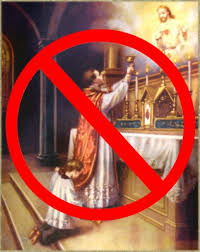August 21, 2014 Posted by Tantumblogo
Here is a scene which has remained profoundly etched in my memory and which will give you an idea of the sufferings of despair. In 1852, a man possessed by the devil was brought to me. He was an excellent man and, in his well moments, an exemplary Christian. The devil spoke through his mouth; he blasphemed against the duration of his ceaseless punishment. A priest who was present said to him, “What conditions would you consent to put up with to obtain a gleam of hope in a million years?” At this point, the demon, who said that he had been a seraph in Heaven by the name of Astaroth, illumined the face of the possessed with a sinister gleam and said to us in a voice hissing with rage, “IF from hell to Heaven there were a column all bristling with scythes, with sabres, and other sharp instruments, and it were necessary to climb up on it every day for a million years, we would all do it just to have one minute of hope; but it is useless!” And blaspheming with rage and anger, he hurled imprecations agaisnt God. “oh,” he said to us, “how unjust God is! You men sinned a thousand times more often than we. We sinned only once, and you renew your crimes every day. Nevertheless, He pardons you. All His love is for you; for us there is only the revenge of justice!” And he tore out his hair in despair; he would have killed himself if we had not prevented him. [Twothings. 1, I pray the priest in question was a trained exorcist, since demons are such skilled and inveterate liars, possessing an intellect that towers in comparison to the most brilliant men, it is advised never to discourse with a demon. It can be done by highly trained exorcists for certain purposes, but most priests and certainly lay people should never do so, unless under the specific direction of an exorcist. 2. St. Thomas describes angelic nature as very different from human. Because they are pure spirit, and equipped with an intellect that is so massive, once they make a decision to sin, or to be virtuous, that decision was made for all time. Of course, they also exist outside of time, so this comparison to the "one" (but ongoing, for all time) sin of demons, to the "many" disparate sins of men in time, is really a false comparison. The demons made their choice to reject God once they found out God was going to save disgusting creatures made out of mud by dying for them, and that choice was permanent, for the reasons given above. Angelic nature cannot really change, in the human sense, once they make a moral decision of this type, they are really locked into it forever. That is my gleaning from the Summa, anyway, I am no expert on St. Thomas]
Observe, moreover, in the Scriptures, the unfortunate rich man in hell. He supplicates father Abraham to give him a drop, a single drop of water, to moisten his parched lips. “But Abraham said, ‘My son, remember that thou didst receive thy good fortune in thy life-time……there is a great gulf fixed between us and you, so that ther eis no passing from our side of it to you, no crossing over to us from yours.” (Lk XVI:25-26) Do you hear that? This man had committed none of those great crimes which human justice punishes; he had simply enjoyed the good things of the world too much. He is condemned without hope, without consolation, forever and ever!
…..But above all, what must be the sufferings of those who acted well during the greater part of their lives, like the priest Saprise, spoken of in the History of the Church. [I do not know work St. Eymard is referencing] He had ever suffered the first torments of martyrdom, but was not able to preserve to the end! These are the real despairing ones, the damned who suffer the most. They had loved God; they had a foretaste of eternal happiness while serving God, and now they see themselves cast out forever! Forever; for there are, says the Sage, three chasms that have no bottom: avarice, death, and hell!
The conclusion for us is to live in wholesome fear, to work out our salvation in awe and trembling. There are certainly in hell many who have sinned less than I! How good God has been not to strike me down at once after my sin! And yet I deserved it. If He had condemned me, I would have had nothing to say. The murderer has no answer to give when he is condemned to death: that is the law of retaliation. Yet any one of my mortal sins has put Jesus Christ to death; I am his executioner and His murderer!
There are some in hell who were regarded as saints during their lifetime. There are surely priests and religious there. That could happen to me, for they were more saintly than I.
Therefore, how good God is not to have abandoned me! ON the other hand, who knows whether I will persevere to the end; that is the great question. I certainly want to; but will I always say that?
————–End Quote—————
That is certainly the purpose of this post. Will I always say that? Will I always receive the Grace of repentance, and will I cooperate with that Grace? We must bear in mind, as unpopular as such is today, even in the Church, Our Blessed Lord Himself said “narrow is the way that leads to salvation, and few there are that enter therein.” He was not joking, nor exaggerating. All the evidence from Sacred Scripture, Tradition, and the testimony of many Saints and visionaries is that most souls – MOST SOULS – are lost. Beg God that you be not one of them.






